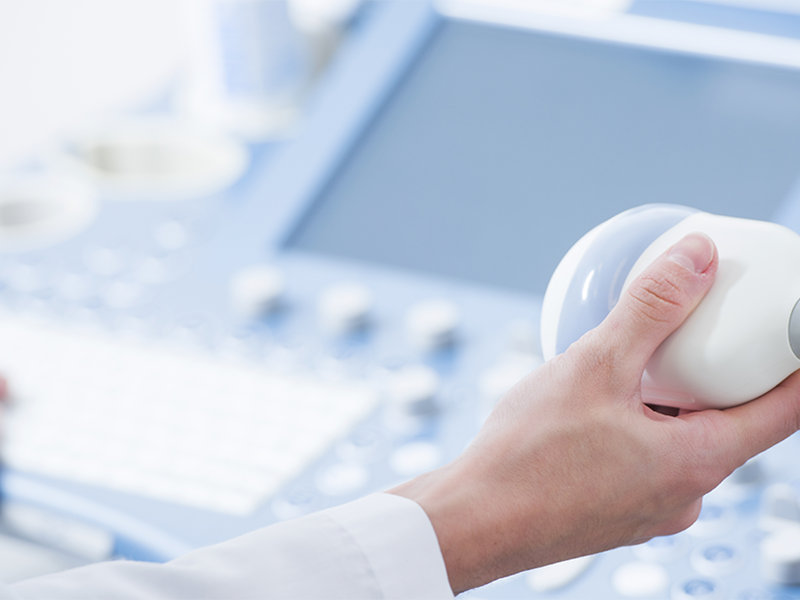
Ultrasound
Watch our video about Ultrasound
What is Ultrasound?
Ultrasound, also known as sonography, is a non-invasive diagnostic imaging technique that uses high-frequency sound waves to create real-time images of the body’s internal structures. Unlike X-rays or CT scans, it does not use radiation, making it a safe option for patients of all ages, including pregnant women.
At Clinic Consultation, we utilise state-of-the-art ultrasound equipment to provide accurate, detailed images for diagnosing and monitoring a wide range of medical conditions. This painless procedure is quick and widely regarded as a versatile tool in modern healthcare.
What is Ultrasound Used For?
Ultrasound is used to diagnose, monitor, and assess conditions affecting various organs, tissues, and blood vessels. It is commonly employed during pregnancy to monitor foetal development and assess the health of the mother and baby. Additionally, it is used to detect abnormalities in the abdomen, heart, and musculoskeletal system.
Ultrasound also plays a crucial role in guiding medical procedures, such as biopsies and fluid drainage, ensuring precision and safety. At Clinic Consultation, ultrasound scans are tailored to address specific medical concerns, providing vital information to guide treatment.
How Does Ultrasound Work?
During an ultrasound, a small handheld device called a transducer is placed on the skin over the area being examined. The transducer emits sound waves that penetrate the body and reflect back when they encounter different tissues. These echoes are converted into real-time images on a monitor, allowing doctors to observe structures and movements.
For certain types of ultrasounds, such as transvaginal or transrectal scans, the transducer is inserted into a body cavity to obtain clearer images. The procedure is non-invasive, painless, and typically takes 15-45 minutes. At Clinic Consultation, patient comfort and safety are prioritised throughout the process.
What Are the Types of Ultrasound?
Ultrasound scans are versatile and can be adapted for various diagnostic purposes:
Abdominal Ultrasound
Examines organs like the liver, kidneys, pancreas, and gallbladder. It is commonly used to detect stones, tumours, or liver disease.Pelvic Ultrasound
Used to evaluate the reproductive organs in women, including the uterus and ovaries, and the bladder and prostate in men. It is essential for diagnosing conditions like ovarian cysts or uterine fibroids.Obstetric Ultrasound
Monitors pregnancy by assessing foetal growth, development, and overall health. It is a standard procedure during prenatal care.Cardiac Ultrasound (Echocardiogram)
Focuses on the heart, providing detailed images of heart structures and blood flow to detect abnormalities.Vascular Ultrasound
Evaluates blood flow in arteries and veins to identify blockages, clots, or varicose veins.Musculoskeletal Ultrasound
Examines muscles, tendons, and joints, helping diagnose injuries, inflammation, or tears.Transvaginal and Transrectal Ultrasound
Provides detailed imaging of the pelvic organs or prostate by inserting the transducer into the vagina or rectum.
Each type of ultrasound is performed by skilled technicians at Clinic Consultation, ensuring precise and comprehensive imaging.
What Conditions Can Be Detected Through Ultrasound?
Ultrasounds are effective in diagnosing a variety of conditions, including:
Gallstones
Identifies stones in the gallbladder causing pain or blockages.Kidney Stones
Detects stones in the kidneys or urinary tract.Pregnancy Complications
Monitors foetal health and detects issues like ectopic pregnancies.Liver Disease
Diagnoses conditions such as fatty liver or cirrhosis.Heart Abnormalities
Evaluates valve disorders, heart failure, or structural defects.Abdominal Aortic Aneurysm
Detects bulging or weakening in the aorta.Soft Tissue Injuries
Identifies tears, inflammation, or cysts in muscles and tendons.
When is Ultrasound Indicated?
Ultrasound is recommended in various situations:
Abdominal Pain
To evaluate the gallbladder, pancreas, or liver for potential issues.Pregnancy Monitoring
Essential for tracking foetal growth and identifying complications.Pelvic Pain or Irregular Bleeding
To assess the reproductive organs or detect fibroids and cysts.Swelling or Lumps
Used to investigate soft tissue masses or lymph node enlargement.Heart or Vascular Concerns
To evaluate blood flow, identify clots, or diagnose heart abnormalities.Injury Evaluation
Diagnoses sprains, tendon tears, or other musculoskeletal injuries.Biopsy Guidance
Ensures precision when sampling tissue from organs or masses.
Pre- and Post-Ultrasound Care
Before the Procedure:
- Follow any fasting instructions if required, especially for abdominal ultrasounds.
- Wear loose-fitting clothing for ease of access to the examination area.
- Inform your doctor if you are pregnant or have any relevant medical history.
After the Procedure:
- Most ultrasounds do not require recovery time, allowing you to resume daily activities immediately.
- Discuss the results with your doctor to understand the findings and plan next steps.
- Follow any recommendations for additional tests or treatments based on the results.
What Are the Contraindications for Ultrasound?
Ultrasounds are generally safe and have no known risks, but certain limitations may apply:
- Difficulty imaging through dense tissues or excess gas in the abdomen.
- Patient movement during the procedure can reduce image clarity.
- Specific conditions, such as deep-seated organs, may require alternative imaging techniques for better resolution.
At Clinic Consultation, we ensure a thorough evaluation to determine the most appropriate diagnostic method for each patient.
What Are the Alternatives to Ultrasound?
For patients requiring alternative imaging, the following options are available:
- MRI: Provides detailed images of soft tissues and organs without radiation.
- CT Scan: Offers cross-sectional views of the body with higher detail for certain conditions.
- X-ray: Effective for evaluating bones or identifying certain abnormalities.
Our team at Clinic Consultation collaborates with patients to choose the best diagnostic tool for their individual needs.
Book Your Ultrasound at Clinic Consultation
Ultrasound is a safe, versatile, and effective diagnostic tool available at Clinic Consultation. Our experienced team provides expert care and accurate results tailored to your health concerns. Schedule your ultrasound online today and take the first step towards better health.
Click here to schedule an appointment online